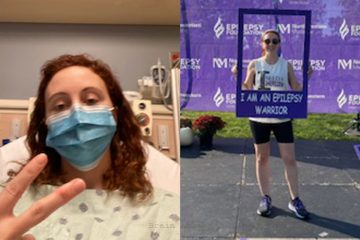To Chris with Love. Thank you for always being there.
“You have epilepsy.”
Can you imagine hearing that? Have you heard it yourself or know someone who has? How did you feel when hearing words like these? Were you ready? Speaking from my own experience, I can say it was heartbreaking, confusing and I was not ready. I was only 21 and struggled with it from the start, influenced by lack of family support, general knowledge, and at the time, I was a junior in college—I had no time for whatever it meant and how it would change my life and affect my memory, health and well-being long-term. For some reason, my parents believed it to be a one-time thing and thought that I was doing fine despite continuing to have seizures. As I educated myself and became clearly aware of what seizures were, the side-effects I was having and starting to wake up in the middle of the night after experiencing nocturnal generalized seizures and not knowing where I was, I realized I had been having them since my mid-teens and when I experienced my first complex partial seizure “feeling” I was 5 years old. I remember the circumstances and it was such a strange, uncomfortable, weird feeling that I had no idea what to think or how to talk about it. That was the only time I remember having a weird feeling when I was young. The nocturnal generalized seizures started in my mid-teens (I only figured it out later not because of waking up after them, but because of the side-effects of them and seeing the same side-effects when I started waking up after them in my early 20s) and the complex partial seizures started in my early twenties. Medication controlled my nocturnal seizures from becoming generalized, but complex partial seizures started occurring at any time. It all just continued to get worse while I was trying to live my life like “everyone else” and I really was. I continued having nocturnal generalized seizures and finally put myself on medicine when one of my friend’s who was a nurse listened and encouraged me a few times that I should get on medicine. It was her care and understanding that really helped me make the choice because I was scared and I had no support other than, gratefully, my boyfriend and eventually my husband at the time. When I decided to start taking medication, that’s when all of the regular doctor visits, medicine trials, testing and referrals started. Honestly, it was really difficult because I was trying to finish college and my grades started suffering my last year (fortunately, I did still graduate) and I really didn’t know how to think about it all or what kind of medical support I should have been getting. You know what would have been amazing? If from the start, I had family who showed that they cared and helped me with my new diagnosis and the real challenges I was having. If my PCP referred me to an experienced epileptologist and they sat me down and explained the situation and all the medicine and treatment options and gave me resources for epilepsy support like The Epilepsy Foundation of America (EFA) or another local group. It also would have helped if my doctor explained to family who was willing to listen the reality of my diagnosis and how it affects me and my everyday life, never mind my professional life. But you know what, none of that happened and I had no idea what I was doing and unless you know what to even think about or ask, most doctors won’t explain anything and don’t take the initiative to offer any kind advice or resources and, naturally, that’s what happened. I spent years going from PCP to neurologist to PCP to neurologist to a PCP that didn’t care to refer me to a specialist unless I really wanted because they could write my medical prescription! I moved a few times so that didn’t help either and not one of them ever gave me any support ideas or ever mentioned groups like the EFA so for many years I didn’t even know about it. I was partly in denial, still trying to live my life like everyone else and didn’t even think to look up anything online. I didn’t know about EFA for years and when I did finally hear about them, I learned they have a 24/7 support number, endless resources and education. Why had I NEVER heard of them? Why didn’t a doctor or healthcare provider ever mention them to me? Fast forward ten years of seeing different doctors, trying different medications at high dosages, multiple Epilepsy Monitoring Unit (EMU) testing visits and me still trying to live my life like “everyone else” and draining myself because of it, my seizures just got worse, my memory was clearly affected and my overall health was continuing to deteriorate. Throughout all of this, I went through different jobs in my marketing career and was let go from one for mentioning my seizures. With my boyfriend who was always there for me, I moved myself to Dallas and eventually found a good job that I really enjoyed yet my seizures continued to get worse, stress from my job didn’t help and I started having seizures at work. Gratefully, the medication was keeping them from turning into generalized seizures, but I continued having clusters of complex partial seizures for days in a row every few weeks. After seeing a few different doctors in the Dallas area and more testing, the sixth neurologist I saw mentioned brain surgery and that was the first time I had heard surgery as an option. My initial reaction to that was no way—it was too invasive, too risky. So, I kept doing what I was doing—working really hard in a high-level job with lots of responsibility (which at the time is what I loved), taking high dosages of medications and having seizures regularly. Then, for the first time, my parents decided to become involved and recommended another doctor to try so I went to my seventh neurologist at University of Texas Southwestern Medical Center. That’s when things started changing—and fast. I tried another medication that didn’t work so they mentioned brain surgery to me as an option and because I was hearing it for the second time, I started considering it. And, honestly, the fact that my parents decided to get involved motivated me even more. So, I had more testing done for surgery, it was my 3rd visit to an EMU, and then I was approved for surgery. I was still hesitant about it and really freaked out actually especially with how I was living my life despite having epilepsy, but I visited my surgeon a few times, talked with someone who had the same brain surgery to hear her experience and talked with a few more doctors to listen to what they thought. It sounded like despite the side-effects and things that could happen, it was still worth it in my life long-term for me to have the surgery to reduce or eliminate the seizures. So, I decided to do it and within ten months of seeing my new doctor and seventh neurologist, I had a left temporal lobectomy and my life has never been the same. It was life-changing in so many ways, not just with seizures. And that is a whole different story! Gratefully, the surgery reduced my seizures to a point where I had none (that I was aware of) for about 6 years, and eventually, I finally got myself off of all medications. I was so happy about that! I was off medication and doing well for about 2 years and then, I believe, with experiencing high levels of stress and sleep challenges for an extended amount of time, I started having auras and nocturnal complex partial seizures again so I eventually got back on a low dose of medication, one that I had not previously taken since I didn’t want to get on any of the medications I had taken before. It has been about 2 years now, and although I occasionally have a cluster of seizures still, I’m doing much better and continuing to adapt to living my life as best as I can after my brain surgery. Honestly, it’s been up and down and bumpy in my life since surgery, trying to create independence again, but I’m so grateful I don’t have seizures all the time like I did before surgery.
I understand experiencing seizures and being diagnosed with epilepsy is overwhelming and life changing. Even if you experience just one seizure it can be life-altering. What helps more than anything is to have a support system that helps you understand seizures and epilepsy and connects with you on a personal level as well. Reaching out to friends or family, researching questions to ask your doctor and connecting with an organization like EFA and support groups like Brain Ablaze, will help you learn about epilepsy and be knowledgeable of all the options today. Doing a little research and reaching out will save you so much pain, heartache and time feeling like you have to go through it all on your own. There are many of us that understand you. We got this!
Copyright © Amber Ann Kaiser 2022


